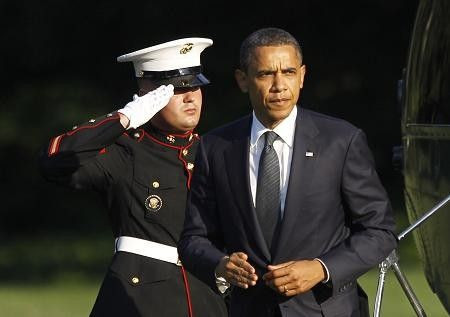5 Reasons Obama Could Lose The 2012 Election
Analysis

Statistics, as they say, don't obfuscate: President Barack Obama's approval rating remains at the sub-ideal level of 48 percent in the latest Gallup Poll, and the poller's Obama-Mitt Romney 2012 election tracking poll is equally sobering: Obama, 48 percent, to Romney, 45 percent.
That means, political science research tells us, that if the 2012 U.S. presidential election was held today, in late-April 2012, the race would be very close and Obama could easily lose to former Massachusetts Gov. Romney.
To be sure, President Obama does have the bully pulpit -- the incumbency advantage that stems from the White House's media megaphone and spotlight -- i.e. it's much easier for the White House to attract media coverage than candidates seeking the office, but if more than a few factors break against the president, the Republicans could recapture the executive branch in 2012.
Here are those factors, from least to most important:
1 Biden Factor. Political science research tells us that the vote for U.S. president is a top only vote -- voters don't include the vice presidential candidate in their voting equation.
That said, a V.P. can sway a state -- usually his/her home state, and perhaps one or two others. There's talk that Obama may ask Vice President Joe Biden, D-Del., to step aside, but that may create a negative backlash in Delaware. To be sure, blue state Delaware is a small state (only three electoral votes) but Biden is also a product of Pennsylvania, and who knows? It's conceivable that just enough Biden folk in Pennsylvania could be offended such that Obama loses Penn. And that would be disastrous for Obama, electorally. The reason? Almost all electoral scenarios assume that Obama wins Pennsylvania: a loss in Penn and the Democratic electoral math becomes very difficult.
2 Campaign Mishaps/Mistakes. Given his sub-optima approval rating, the pressure is on Obama's 2012 Campaign managers to run a tight, error-free campaign, with a specific, succinct message.
More than one presidency-in-the-making was ruined by a poor campaign -- the 2000 presidential campaign of former Vice President Al Gore, D-Tennessee, is perhaps the most notorious, recent example, and it's a painful data point for Democrats. Gore's huge error: Not deploying the very popular President Bill Clinton on the campaign throughout; had he done so, Gore, not George W. Bush, would have become our nation's 43rd president.
3 Youth Vote Disillusionment And Voting District Intimidation. America's young adults, ages 18-30, turned-out big-time in support of Obama in 2008, as he epitomized the younger, postmodern, cool American candidate. Again, Obama needs 20-somethings to break for him en masse to win in 2012.
Similarly, turnout by African-Americans and Hispanic-Americans, and in particular, by the working poor, was strong in 2008, and there is concern that selected districts and/or groups may attempt to intimidate these Americans to prevent them from going to the polls.
Simply, every Democratic, community organization must be mobilized to ensure that every American is able to exercise his U.S. Constitution-protected right to vote. If anything less occurs, it will hurt Obama.
4 Alienated Liberals. Again, simply, this is another must-have for Obama. Liberals must turn out and donate to Obama in a major way to balance the onslaught of deep-pocketed, motivated conservatives bent on re-creating the Bush presidency or the United States of America circa 1952 (or even 1900). Any campaign fund doldrums will depress the Democratic vote.
5 U.S. Job Growth. Finally, and most importantly, President Obama, and fellow Democrats, must -- using every mechanism available to implement policies that create jobs -- minimally 150,000-175,000 per month. Ideally: more than 200,000 per month to substantially lower the totally unacceptable 8.2 percent U.S. unemployment rate. Up until March's job report, the U.S. economic expansion was creating an average of 200,000 new jobs per month over the past 6 months. March's job report was a disappointment, as only 120,000 jobs were created, according to the U.S. Labor Department, and that's raised concern that the economic expansion is decelerating.
Simply, if robust job growth does not return, it's likely that Obama will lose the 2012 election. There is a strong correlation between the unemployment rate and the vote for U.S. president. If the unemployment rate is rising, that's bad news for the incumbent; if it's falling, that's good news.
Further, it doesn't matter that the recession started before President Obama took the oath of office. The rule of the U.S. presidency is: after you enter the White House, any existing national problem becomes your problem.
Hence, keep an eye on job growth: barring an international crisis, it will be the most important issue in the 2012 campaign.
The Good News
The good news for Obama is that the election is not today: it's 7 months from today, in November 2012.
But the electoral equation for Obama is clear: use every mechanism you have in your disposal to create jobs.
--
© Copyright IBTimes 2025. All rights reserved.





















